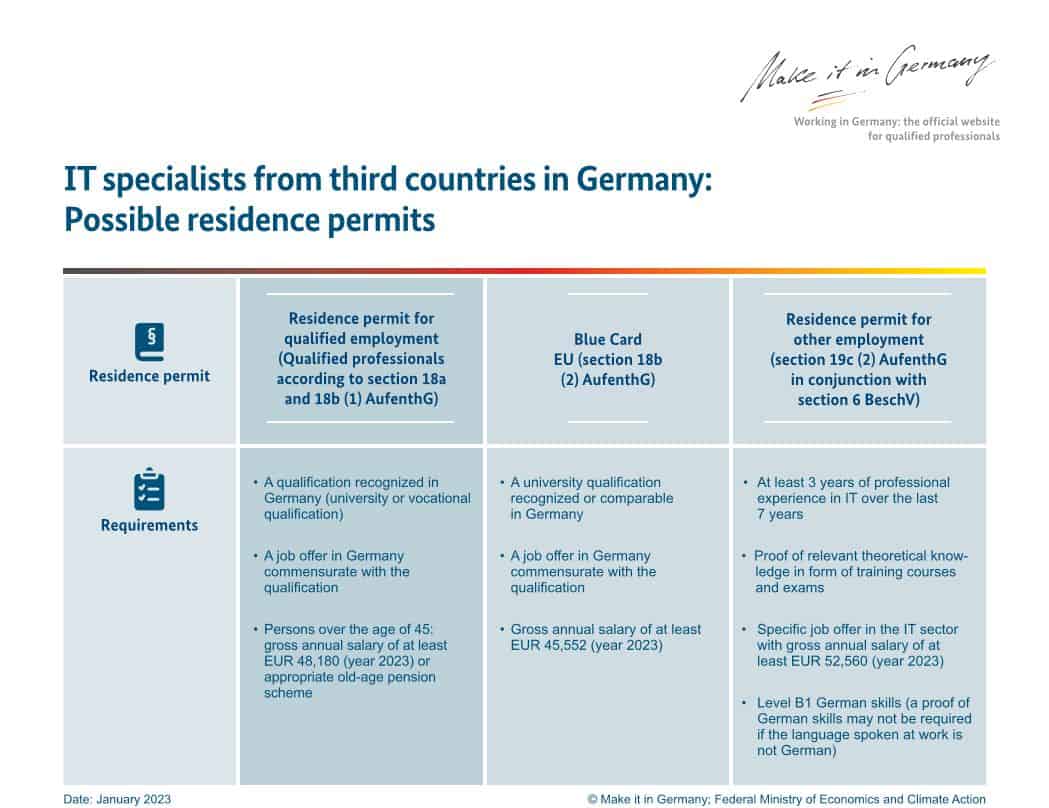The industry association Bitkom sees an even tighter situation on the market for IT specialists than before the start of the corona pandemic. The drama surrounding the IT skills shortage is coming to a head. Germany’s companies currently lack 137,000 IT experts. Corona had slightly mitigated the shortage of IT personnel in the meantime. Compared to 2019, before the pandemic, the number of unfilled positions has increased by 13,000.
“The shortage of IT professionals has worsened dramatically”.
The reason for this is the continuing demographic change,” said Bitkom President Achim Berg today at the presentation of a representative survey in September of around 850 companies from all sectors.
The dilemma: Fewer and fewer young people are entering the job market, while at the same time more and more older people are leaving. 70 percent of the companies surveyed expect the shortage of skilled workers to get even worse. This is a frightening forecast for the digital transformation in Germany. The IT staff shortage is becoming its main obstacle.
German labor market in decline
Currently, the labor market in Germany is declining overall. According to a company survey by the Institute for Employment Research, the number of job vacancies fell by 5 percent in the third quarter of 2022 compared with the previous quarter. However, at 1.8 million vacant positions, it remains at a very high level.
Compared to the third quarter of 2021, there are currently about 438,000 job openings, or about one-third more. The current decline can be partly explained by the war in Ukraine and the resulting energy crisis. The trend has been for vacancies to rise for years: At the end of 2010, there were 803,000 – today there are one million more.
Long search for specialists
As a result, it’s taking longer and longer for companies to find skilled workers. “Here, too, there is a clear shift in the wrong direction,” says Berg. On average, it now takes 7.1 months to fill an IT position. That’s an increase of a good two weeks over last year. When it comes to filling their vacancies, companies find their staff primarily through unsolicited applications (97 percent) and job advertisements (93 percent). Both figures are virtually unchanged from the previous year.
There was a sharp increase in the hiring of interns, headhunting and active sourcing, the targeted approach to interesting candidates. According to Berg, the latter is “quite successful”. After all, one-fifth of the companies get new IT personnel this way.

Simplify applications
When recruiting, companies try to make applications as simple as possible to make the process easier for applicants. They accept applications by mail, through tools and apps, and directly from business networks. Those who like may send their application portfolio in writing.
Companies also rely predominantly on digital methods in the rest of the application process. Three quarters use video conferencing for job interviews at least in part, and almost as many operate an application pool. This is a database with profiles of potential candidates that is used for active sourcing. “Companies are playing the full range of instruments when it comes to recruiting,” says Berg. That helps in individual cases, but it doesn’t solve the shortage of skilled workers in the economy as a whole.
Number of first-year students declines
Despite excellent career prospects, interest in studying computer science is declining. From 2019 to 2021, the number of first-year students fell by 6,000 to 72,000. Only less than half also complete their studies. Studying computer science is considered extremely demanding. About 31,000 did so last year.
A degree is one path to computer science; immigration of IT professionals is another. “Policymakers should make immigration easier,” Berg says. The German government is currently working on an amendment to the Skilled Worker Immigration Act. Berg says it is important to consider practical work experience just as much as formal degrees. He believes it is important to digitalize and de-bureaucratize the immigration process. None of these are new demands; Berg has been making them for years and now hopes that something will finally happen. Above all, that Germany becomes attractive for immigrants. So far, she says, there has been very little interest.
Immigration from Russia and Belarus as a solution?
At present, the immigration of IT specialists from Russia and Belarus is an attractive option to combat the shortage of skilled workers. Around one-third of companies with vacancies would hire Russian and Belarusian IT experts, provided they first passed an official security check.
In fact, only one in a hundred companies has hired IT professionals from these countries. One in ten that wanted to hire IT personnel from there failed due to bureaucratic hurdles. “I was particularly annoyed by that in the survey results,” says Berg.
Bitkom estimates that there are 59,000 jobs that could be filled by IT specialists from Russia and Belarus. There are said to have been around one million IT specialists in these countries before the war. A quarter have already left the country. According to Berg, no IT specialists should be poached from Ukraine. That would weaken the country.
Hays sees less dramatic shortage
According to the Hays Skilled Workers Index, the shortage of IT specialists is not as dramatic as the Bitkom survey makes it out to be. According to the index, the search for IT experts has been slackening since the beginning of the year, with 12 percent fewer jobs advertised in the first three quarters compared to the same period last year.
In absolute terms, however, a good 100,000 IT specialists are still being sought each month. However, the decline is the first since the first survey of the index in 2015. For the index, the HR consultancy evaluates job advertisements of the most frequented online job exchanges, daily newspapers and the business network Xing.
Source: Heisse Online – 16.11.2022 –
https://www.heise.de/news/Bitkom-Deutsche-Wirtschaft-sucht-137-000-IT-Fachkraefte-7341815.html

Which would be the most promissing Jobs for foreigner without german language skills?
As a foreigner without German language skills, it may be more challenging to find a job in Germany, as proficiency in German is often a requirement for many jobs. However, there are still some job sectors where English may be the primary language used or where language skills are not as crucial. Here are some examples of jobs where it may be more certain to find work as a foreigner without German:
- Information Technology (IT) – There is a growing demand for IT professionals in Germany, and many companies use English as their primary language for communication and documentation.
- Customer Service – Many international companies have customer service centers in Germany, and they may require employees who can speak multiple languages, including English.
- Hospitality and Tourism – In cities like Berlin and Munich, there are many hotels and restaurants that cater to international tourists. These businesses may require staff who can speak English and other languages.
- Teaching English as a Foreign Language (TEFL) – There is a high demand for English teachers in Germany, and many language schools and institutions offer TEFL courses and job opportunities for non-German speakers.
- Research and Development – Many multinational corporations and research institutions in Germany conduct research in English and may require employees who are proficient in the language.
It’s important to note that having German language skills may still give you an advantage in the job market, and it’s always a good idea to try and learn the language to improve your chances of finding work in Germany.
How much you can earn in average in the mentioned jobs
The salary you can earn in the jobs mentioned above can vary depending on a variety of factors, including the regional location and the size of the company you work for.
- Information Technology (IT) – The salary for IT jobs in Germany can range from €40,000 to €100,000 or more, depending on the level of experience, expertise, and responsibility. Salaries may also vary depending on the region and the size of the company. For example, salaries in the larger cities like Berlin and Munich may be higher than in smaller towns or rural areas.
- Customer Service – The salary for customer service jobs can vary widely, with entry-level positions starting around €20,000 to €25,000 per year, and more experienced positions paying up to €50,000 per year. The salary may also depend on the company size, with larger companies typically paying higher salaries.
- Hospitality and Tourism – The salary for jobs in hospitality and tourism can vary depending on the position and the size of the company. For example, a hotel receptionist might earn around €20,000 to €25,000 per year, while a hotel manager could earn over €50,000 per year. The salary may also depend on the region, with higher salaries typically offered in larger cities with more tourism.
- Teaching English as a Foreign Language (TEFL) – The salary for TEFL teachers can vary depending on the type of institution you work for, such as private language schools or public schools. In general, salaries can range from €1,500 to €3,500 per month, depending on the number of teaching hours and the location.
- Research and Development – Salaries for research and development jobs can vary depending on the level of expertise and the size of the company. In general, entry-level positions may start around €40,000 per year, while more experienced professionals could earn over €100,000 per year.
Overall, regional and company size differences can have a significant influence on salaries in Germany. Salaries tend to be higher in larger cities and for larger companies with more resources, but this can also vary depending on the specific job and industry. It’s always a good idea to research the average salaries for your field and region to get a better understanding of what you can expect to earn.
